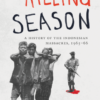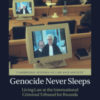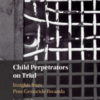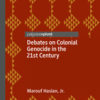Books

Confronting Humanity at its Worst: Social Psychological Perspectives on Genocide
Edited by Leonard S. Newman. How do otherwise ordinary people become perpetrators of genocide? Why are groups targeted for mass killing? How do groups justify these terrible acts? While there are no easy answers to these questions, social psychologists are especially well positioned to contribute to our understanding of genocide and mass killing. With research…
Read more
The Killing Season: A History of the Indonesian Massacres, 1965-66
By Geoffrey B. Robinson. The Killing Season explores one of the largest and swiftest, yet least examined, instances of mass killing and incarceration in the twentieth century—the shocking antileftist purge that gripped Indonesia in 1965–66, leaving some five hundred thousand people dead and more than a million others in detention. An expert in modern Indonesian…
Read more
Genocide Never Sleeps: Living Law at the International Criminal Tribunal for Rwanda
By Nigel Eltringham. Accounts of international criminal courts have tended to consist of reflections on abstract legal texts, on judgements and trial transcripts. Genocide Never Sleeps, based on ethnographic research at the International Criminal Tribunal for Rwanda (ICTR), provides an alternative account, describing a messy, flawed human process in which legal practitioners faced with novel…
Read more
Child Perpetrators on Trial: Insights from Post-Genocide Rwanda
By Jastine C. Barrett. Following a devastating genocide in 1994, the Rwandan government elected to hold all perpetrators accountable – including children. Thousands of children were held in prisons while awaiting charges; some were later convicted. This book is about these children. Drawing on interviews and extensive archival research in Rwanda, it documents their journey…
Read more
Genocide and Mass Violence in Asia
Edited by Frank Jacob. In Asia the “Age of Extremes” witnessed many forms of mass violence and genocide, related to the rise and fall of the Japanese Empire, the proxy wars of the Cold War, and the anti-colonial nation building processes that often led to new conflicts and civil wars. The present volume is considered…
Read more
International Crimes: Law and Practice, volume 1 – Genocide
By Guénaël Mettraux. Judge Mettraux’s four-volume compendium, International Crimes: Law and Practice, will provide the most detailed and authoritative account to-date of the law of international crimes. It is a scholarly tour de force providing a unique blend of academic rigour and an insight into the practice of international criminal law. This first volume discusses…
Read more
Debates on Colonial Genocide in the 21st Century
By Marouf Hasian, Jr. This book analyses the debates on colonial genocide in the 21st century and introduces cases where states are reluctant to acknowledge genocides. The author departs from traditional studies of the work of Raphael Lemkin or U.N. definitions of genocide so that readers can examine genocide recognition as a political act that is…
Read more
The End of the Ottomans: The Genocide of 1915 and the Politics of Turkish Nationalism
Edited by Hans-Lukas Kieser, Margaret Lavinia Anderson, Seyhan Bayraktar and Thomas Schmutz. In the early part of the twentieth century, as Europe began its descent into the First World War, the Ottoman world – once the largest Empire in the Middle East – began to experience a revolution which would culminate in the new, secular Turkish state. Alongside…
Read more
The Holocaust in the Romanian Borderlands: The Arc of Civilian Complicity
By Mihai Poliec. This volume examines the changing role which ordinary members of society played in the state-sponsored persecution of the Jews in Bukovina and Bessarabia, both during the summer of 1941, when Romania joined the Nazi invasion of the Soviet Union, and beyond. It establishes different patterns of civilian complicity and discusses the significance…
Read more
The Auschwitz Sonderkommando: Testimonies, Histories, Representations
By Nicholas Chare and Dominic Williams. This book is the first to bring together analyses of the full range of post-war testimony given by survivors of the Sonderkommando of Auschwitz-Birkenau. The Auschwitz Sonderkommando were slave labourers in the gas chambers and crematoria, forced to process and dispose of the bodies of those who were murdered….
Read more
